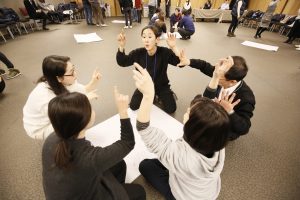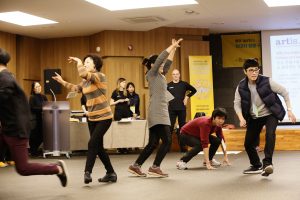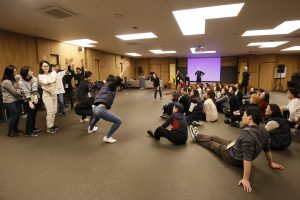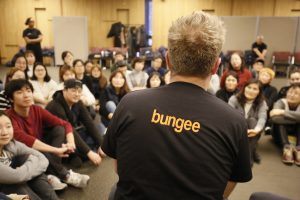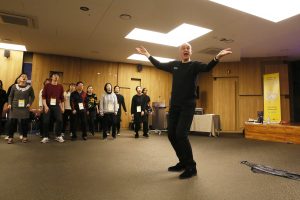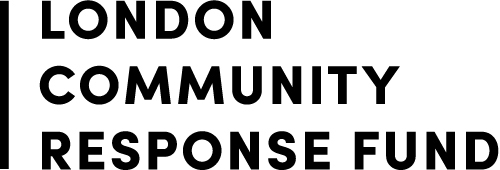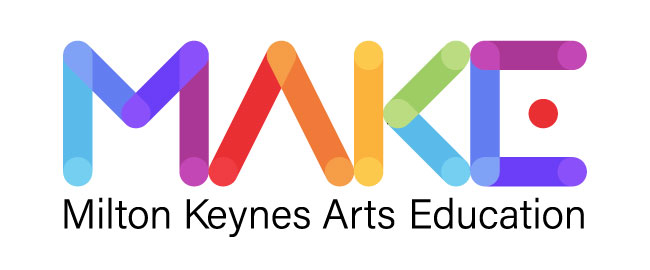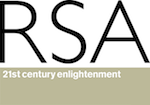Creativity takes courage: Artis in South Korea
|
By Katie Elphick (Splash), Programmes Manager “Creativity takes courage”
Prominently displayed on the tote bags and notebooks distributed to participants during Artis’ recent five-day teacher training in South Korea, no truer statement could be made about our work together. Developed in partnership with the Chung Mong-Koo Foundation, The Creative Arts Programme for Teachers brought together 50 teachers and school social workers from across South Korea.
Led by our Director of International Education, Nigel Mainard, and a team of Artis Mentors, the five-day programme focussed on sharing new activities and approaches in movement, music and drama to bring creativity to classroom teaching.
Teachers explored the foundations of pitch, pulse, building rhythms in music, qualities of movement, and creating dramatic characters and worlds; they worked on cultivating a performance environment for their students and established how to deliver a holistic learning session in the way Artis does. They also examined the possibilities for creating strong links between the arts and core curriculum topics, such as music and maths and drama and literacy.
“Their confidence blossomed beautifully as their creative skills grew”
Before attending the training, each teacher was asked to complete a personal profile outlining why they wanted to participate in the course, and which of the performing arts they felt most confident in. Interestingly, many of the responses were about them being ‘a little shy’ or ‘not at all confident’ in the arts. Several teachers noted a lack of expressiveness in their classrooms as something they were most hoping to change by coming on the course.
Throughout the five days with Artis, we witnessed the teachers laugh, play and become curious about new ways they could engage their children in learning. We watched their confidence blossom beautifully as their creative skills grew – much in the same way it does with the children we work with each week in the UK.
South Korea is known for having one of the more rigorous and highest performing school systems in the world. Students often spend 12 hours each day on their education: attending school and then travelling to a hagwon (tuition centre) to continue studying and revising into the evening.
Yet, whilst children are excelling in league tables, the teachers we worked with shared not only the pressure it places on their pupils, but on their own feeling of joy in their teaching.
“Educators are looking at ways to create space for play and discovery to enhance learning”
The Korea Development Institute think tank has expressed that:
“Test scores may be important in the age of industrialisation, but not anymore. So we look into the ways to reform our education system, not based on test scores, but based on creativity and social and emotional capacities” (qtd in BBC, 2013).
Indeed the Vice Chairman of the Chung Mong-Koo Foundation, Mr. Lee, said that he believed that the UK was further ahead in our attempts to inject creativity into the classroom environment, one of main reasons they engaged Artis to deliver this training to teachers. With creativity now becoming more of a government priority in South Korea, educators are looking at ways to create space for play and discovery to enhance learning.
There seems to be no doubt that creativity is beneficial for all of us. Back in the UK, London Mayor Sadiq Khan recently shared his thoughts on the importance of creativity in the curriculum, saying:
“When you speak to successful people in science or tech, they say one of the things that leads to lateral thinking is people doing arts. It makes you think innovatively, think differently. Not only does the teaching of arts in school lead to future artists, it helps people in different sectors in how the brain functions.” (qtd in TES, 2017)
“The Far East are introducing arts at a time when we are taking them away”
Yet, whilst Korea is beginning to turn their attention towards the vital necessity of creativity in education, Khan feels that the UK is going in the opposite direction, stating:
“[You] are seeing curriculums in the Far East introducing arts at a time when we are taking them away. It doesn’t make sense.” (qtd in TES, 2017)
Artis’ belief has always been that encouraging creativity reaps the benefits education systems are looking for: confidence, resilience, creative thinking, enquiry, participation, problem-solving and teamwork among others.
Our commitment to sharing this vision with the teachers in Korea has included a post-course virtual mentoring programme for teachers to submit a video recording to their assigned Artis Mentor of activities they have taken from the training and tried in their own classroom. Their UK mentor provides feedback and suggestions, which the teacher then takes back to implement in their classroom.
“Find ways to give the best possible learning experiences to all children”
Artis believes that professional development for teachers requires on-going support and challenge through both course delivery and mentoring to effect change in ways of thinking and skills. We place such a strong emphasis on mentoring as part of the way we work at Artis, because, as Nigel Mainard shares:
‘It is so important to continually strive to find ways to give the best possible learning experiences to all of our children in schools.”
We cannot wait to see what magical moments each teacher captures as they bring a piece of our shared experience back to their own children and classroom setting.
Creativity does take courage, but what we know is that the results – and most importantly, our children – are worth it.
Sources: |
05 Apr 2017 |

